Human Rights

California Attorney General Kamala Harris asked a state court March 25 for an order allowing her to avoid processing a citizen-proposed anti-gay ballot measure that calls for executing gays with “bullets to the head.”
Harris said the so-called “Sodomite Suppression Act” proposed and named by Huntington Beach attorney Matthew McLaughlin “not only threatens public safety, it is patently unconstitutional, utterly reprehensible and has no place in a civil society.”
She filed an action asking the court for declaratory relief and judicial authorization allowing her to avoid issuing a title and summary for the proposal. An official state title and summary are necessary steps in authorizing a ballot initiative’s sponsors to seek the signatures needed to be placed before voters.
Without the court order, Harris said she would be compelled by law to proceed with the measure, which would authorize the killing of gays and lesbians in the state.

Is anti-Semitism rising on U.S. college campuses?
According to most statistics, yes — but the phenomenon is far more complicated than it first appears, primarily because everyone oversimplifies it.
The data, and the anecdotes, are shocking. In a study conducted in spring 2014 (notably, before the Israel/Gaza conflagrations of last summer), 54 percent of Jewish students said they had personally witnessed or experienced an anti-Semitic incident. And in just the last two months, swastikas have been painted on walls at the University of California’s Berkeley and Davis campuses and at New York’s John Jay College.
But what do these incidents mean? There is a great reluctance even to engage with the question.
Among liberals, even though it is obvious that many of these incidents are motivated in part by Israel/Palestine politics, no one wants to give hatred a pass. A swastika is a swastika, graffiti is graffiti, and collective guilt — in this case, blaming all Jews for specific actions of Israel — is always wrong.
Conservatives, meanwhile, routinely conflate anti-Israel and anti-Semitic speech. The far-right David Horowitz Freedom Center, for example, recently released its list of the American college campuses with the “worst anti-Semitic activity.” But many of those activities were protests of Israel. Extreme, perhaps, and unfair; but not really the same as anti-Semitism.
The fact is, the borders of anti-Semitism are permeable. Human speech does not divide neatly into “hate speech” and “political speech.” Thus, if we are to avoid the over-generalizations, we must be more rigorous in our definitions of the phenomenon or we risk diluting the evil of anti-Semitism itself.
In fact, a swastika is not just a swastika. Consider an anti-Israel protest that depicts an Israeli flag with a swastika on it. Offensive, to be sure. But what is it saying? It’s saying that Nazis are bad, and that the Israeli government is Nazi-like.
Now consider an anti-Semitic incident in which someone sprays a swastika on a synagogue door. Also grossly offensive, to say the least. But it is saying something very different. It is saying that Nazis are good, and we should finish the work they started.
The same symbol thus has two nearly opposite meanings.

In Cafe Elfenbein, which opened last year in a trendy Berlin neighborhood, two businessmen wearing yarmulkes — Jewish skullcaps — chat away.
The aroma of freshly brewed coffee and homemade rugelach pastry fills the shop, where a rabbi has certified that all its food is kosher.
The hip addition to the city points to a trend obscured by rising anti-Semitism and terror attacks in France and Denmark that have alienated Jews. In central and Eastern Europe, Jewish life is thriving.
One major reason is that a young and more confident generation is shaping a new Jewish identity.
“Jewish life is flourishing in Berlin and the rest of the country,” said Jutta Wagemann, spokeswoman for the Central Council of Jews in Germany.
The Jewish community in Germany remains small, about 200,000 out of 80 million people. It has grown significantly from its postwar population of 37,000 in 1950 because of immigration from the former Soviet Union. The community is putting its stamp these days on the country’s cultural landscape.
In the East German city of Cottbus, an area known for right-wing extremists, a disused church was recently turned into a synagogue, providing space for the 460 members of the Jewish-Russian community.
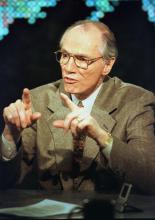
The former president of Bob Jones University, one of the nation’s bastions of Christian fundamentalism, has apologized for comments he made in 1980 that gays and lesbians should be stoned to death.
Jones, who stepped down as BJU president in 2005, made the original remarks while visiting Jimmy Carter’s White House, delivering a petition with 70,000 signatures opposing greater legal protections for gays and lesbians.
“I’m sure this will be greatly misquoted,” Jones said at the time.
“But it would not be a bad idea to bring the swift justice today that was brought in Israel’s day against murder and rape and homosexuality. I guarantee it would solve the problem post-haste if homosexuals were stoned, if murderers were immediately killed as the Bible commands.”
In a statement issued by the university on March 21, Jones called his earlier comments “inflammatory” and “reckless.”
“Upon now reading these long-forgotten words, they seem to me as words belonging to a total stranger — were my name not attached,” he wrote.
“I cannot erase them, but wish I could, because they do not represent the belief of my heart or the content of my preaching. Neither before, nor since, that event in 1980 have I ever advocated the stoning of sinners.”

For the past 20 years or so, adoption has grown to become a staple of much of Christian culture in America. So much so that one could actually argue that adoption has become trendy within evangelical circles. As I’ve said before, if something were to become trendy, I’m glad that helping kids in need is one of them — though the trendiness of adoption has certainly led to some negative outcomes as well. While I won’t get into all of the aspects where adoption culture has gone wrong — that could take a series of posts — I do want to address what I feel is the most critical oversight we have made, and how we begin to fix it.
Orphan care is critical to the life of a Christian whether one is called to adopt (and trust me, not everyone is called to adopt — it’s not all rainbows and sunshine kisses). Caring for orphans is something we see consistently expressed in both the Old and New Testaments. In fact, James goes as far as saying that caring for widows and orphans is the only religion that God finds acceptable. While Christian culture for the past few decades has certainly taken that calling seriously, I think it is time for adoption culture to shift its focus in order to take the issue more seriously and to more effectively address the real issue at hand.
How did we miss the most important aspect of orphan care? This stems from a misunderstanding and misdiagnosis of the problem. Much of adoption culture has been led to believe that there is an orphan crisis in the world today with somewhere around 153 million children being orphaned. On the surface, this number of 153 million (provided by UNICEF) understandably leads one to believe that tonight there will be 153 million children who will go without the loving embrace of their parents. It’s a number so staggering that one can easily understand why culture mobilized and began adopting these children at rapid pace.
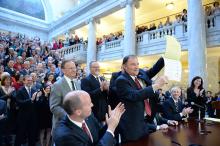
Utah’s new law extending employment and workplace protections to LGBT people and conscience protections to individuals, churches, and faith-based associations extends an olive branch to both groups, even as it misses one key sticking point.
Panelists for two discussions hosted by the Brookings Institution on March 16 described key features of the legislation, noting that it is:
- Unique to Utah, with its distinctive religious and political history, not a template for other states or for federal legislation.
- A measure of healing between the Church of Jesus Christ of Latter-day Saints and LGBT people.
- A law that says nothing about whether bakers, florists or other vendors must accept customers planning a same-sex wedding, even if such marriages violate their religious beliefs.
- A layer of robust protections for religious groups.
Even though other states may not replicate this law exactly, it can serve as a toolkit for orchestrating opposing forces to find common ground, legal and political, experts said.
Former Utah Gov. Michael Leavitt, a Mormon who cautioned that he was not a spokesman for the church, called the legislation “a great victory for the protection of conscience.”
Leavitt said the LDS church convened the effort to write the legislation with LGBT activists in an effort to heal the tensions between the two communities, inflamed when the church joined efforts to ban same-sex marriage in California in 2008.
“It is a doctrine of the church that marriage is between one man and one woman and it will not change,” said Leavitt.
But it is also a doctrine of the church that “Jesus Christ would not abide by the withholding of shelter or sustenance or care.”

An LDS apostle reaffirmed recently that Mormons who support gay marriage are not in danger of losing their temple privileges or church memberships — even though the Utah-based faith opposes the practice.
In an interview March 13 with KUTV in Salt Lake City, Elder D. Todd Christofferson said that individuals in the 15 million-member Church of Jesus Christ of Latter-day Saints would be in trouble only for “supporting organizations that promote opposition or positions in opposition to the church’s.”
Backing marriage equality on social media sites, including on Facebook or Twitter, “is not an organized effort to attack our effort, or our functioning as a church,” Christofferson said in the interview.
The KUTV interviewer asked further if a Latter-day Saint could “hold those beliefs even though they are different from what you teach at the pulpit?”
Yes, the apostle answered.
“Our approach in all of this, as (Mormon founder) Joseph Smith said, is persuasion. You can’t use the priesthood and the authority of the church to dictate. You can’t compel, you can’t coerce. It has to be persuasion, gentleness and love unfeigned, as the words in the scripture.”
Christofferson echoed this sentiment in two January interviews with The Salt Lake Tribune.
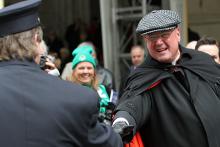
St. Patrick’s Day is associated as much with Roman Catholicism as it is with Irish-Americans, but this year some of the faithful aren’t happy with the inclusion of gays and lesbians marching under their own banner for the first time in parades in Boston and New York.
The Knights of Columbus of Massachusetts and a local Catholic school declined to take part in the Boston parade on March 15 after two LGBT groups — the military veterans service group OutVets and Boston Pride — were invited following decades of lobbying and court battles.
“The saint’s venerable name should not be cheaply misappropriated by nominally Catholic politicians and anti-Catholic organizations with a same sex agenda,” said Catholic Action League head C.J. Doyle, a leader of the opposition.
The New York parade marches down Fifth Avenue on March 17, the saint’s feast day, and Cardinal Timothy Dolan is facing renewed calls from conservative Catholics to step down as grand marshal because an openly LGBT group is taking part for the first time.
When it was first announced last September that an organization of LGBT employees at NBC — the network that broadcasts the popular event — would be marching, Dolan voiced support for the parade organizers and prayed “that the parade would continue to be a source of unity for all of us.”
Critics ripped Dolan for his stance, and they ramped up their efforts as the day approached.
“Now there can be no doubt — Timothy Cardinal Dolan has been played for a sucker by the organizers of the 2015 New York City St. Patrick’s Day parade. He must step down as Grand Marshal,” Matthew Hennessey wrote at the website of Crisis magazine, a conservative Catholic media outlet.
“(B)y personally leading the procession, he blesses the whole shameful affair,” he concluded.
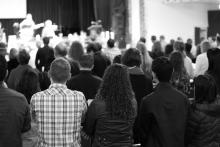
A prominent evangelical Christian church in San Francisco has announced it will no longer ask members who are lesbian, gay, bisexual, or transgender to remain celibate.
“We will no longer discriminate based on sexual orientation and demand lifelong celibacy as a precondition for joining,” senior pastor Fred Harrell, Sr. and six board members of City Church, one of the largest members of the Reformed Church in America denomination, wrote to members in a letter emailed to members March 13.
The church, which claims about 1,000 attendees and meets at two San Francisco locations, has long welcomed LGBT persons to attend, but has required life-long celibacy of those LGBT persons seeking membership.
“Imagine feeling this from your family or religious community,” the letter states.
“‘If you stay, you must accept celibacy with no hope that you too might one day enjoy the fullness of intellectual, spiritual, emotional, psychological and physical companionship. If you pursue a lifelong partnership, you are rejected.’ This is simply not working and people are being hurt. We must listen and respond.”
City Church’s action places it in the ranks of at least two other large, urban evangelical congregations that have reversed their policies requiring celibacy for gay members. In January, both Nashville’s GracePointe Church and Seattle’s EastLake Community Church reversed their celibacy policies.
The policy of many evangelical denominations and independent churches is that homosexuality is “incompatible” with the Bible and therefore cannot be tolerated among members, or the broader society.



Samantha Elauf was a teenager who loved clothes and applied to work in an Abercrombie & Fitch Kids store in her native Tulsa, Okla., in 2008. But Elauf, a Muslim, also happens to wear a headscarf. So she didn’t get the job.
No one — not even Abercrombie & Fitch — disputes that her hijab cost her the job offer. And the law, Title VII of the Civil Rights Act of 1964, states that an employer can’t deny employment based on an worker’s religious practice, unless accommodating it would prove terribly burdensome.
At the time, Abercrombie had a “no hats” policy for its sales associates. When the U.S. Supreme Court heard Elauf’s case on Feb. 25, Justice Ruth Bader Ginsburg summed up the religious exemption required of the company: “Title VII doesn’t require accommodating baseball caps, but it does require accommodating religious practice.”
So why did this case make it all the way to the Supreme Court?
Elauf, though she won in a federal district court in 2011, lost in a federal appeals court in 2013. At the 10th U.S. Circuit Court of Appeals in Denver, the company’s argument — that it shouldn’t have had to give a religious accommodation because Elauf never asked for one — found traction.
Do we really want companies delving into an applicant’s religious practice in order to determine whether the person might want an accommodation, Abercrombie lawyer Shay Dvoretzky asked the justices on Wednesday.
“This will inevitably lead employers to stereotype,” he said.
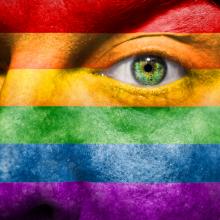
My heart breaks. My head hurts. My spirit is broken on the question of LGBTQ inclusion in Christ’s church. In many ways, I am in right place in the Evangelical Covenant Church (ECC). We affirm the central role of friendship in our life together. We believe in the freedom to hold diverse theological views in the spirit of renewal. Yet, to draw from Martin Luther King Jr.’s phrase, freedom has a dull ring for me on this topic. Not only have some in my church family questioned the right to hold a minority view on LGBTQ questions, they have questioned the spirit of dissent.
The faithful pursuit of deeper answers in conversation with Scripture generates enormous fear, and this fear is understandable. Talking about LGBTQ questions is divisive in the current climate. Many believe the church has clearly spoken on this topic. Those ecclesial groups who have engaged it have lost churches and people. Understandably, leaders want to avoid this kind of thing happening under their watch. Still, pastors and lay people are on the front lines of ministering with and to their LGBTQ members — some of whom are clearly gifted for ministry and should be working themselves as pastors.
I could cite stories of bullying, statistics on youth suicides, or examples of micro-aggressions directed at the LGBTQ community on a daily basis. The evangelical world knows this, however, and they still insist on debating the theology. So here is where I, as a Christian ethicist, underscore the importance of faithful dissent. Why? For starters, Jesus did it all the time, and yes, he drove a lot of people crazy. For reference, see Matthew, Mark, Luke and John. The fact is, sometimes the majority view gets it wrong. We see it over and over throughout church history.
What does dissent look like? The ECC has a beautifully written report on biblical authority and Christian freedom that offers a set of reflections on the relationship between Scripture and the practice of theology. Five themes woven throughout this theological short and our archival documents offer helpful parameters for evangelicals discerning the parameters of faithful dissent. These five criteria offer up what I call “Best Practices for Faithful Dissent.”
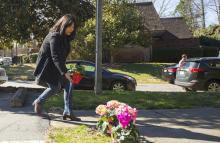
Preliminary police reports describe a long-simmering dispute over parking as the motive for the killings of three Muslim students at a Chapel Hill condominium Feb. 10.
But many Muslims in the Raleigh-Durham community and beyond are not so sure. The triple murders in this usually harmonious university town immediately took on a larger narrative of hate crimes against Muslims and charges of atheists baiting Muslims.
On Wednesday, police charged Craig Stephen Hicks, 46, of Chapel Hill with three counts of first-degree murder.
They allege he shot Deah Shaddy Barakat, 23, and his wife, Yusor Mohammad Abu-Salha, 21, and Abu-Salha’s sister, Razan Mohammad Abu-Salha, 19, of Raleigh inside their condominium near the University of North Carolina campus in Chapel Hill.

I WALKED THROUGH the halls of the Rosa Parks Museum in Montgomery, Ala.—slowly. Original documents lined the walls of the nation’s central memorial to the local actions that helped trigger the national mass movement for civil rights. To skim would have been a sacrilege. Each document was evidence. Evidence of struggle. Evidence that America’s apartheid happened. Evidence of a miracle.
The museum is like a labyrinth. Each room builds on the last, adding color and depth to a reality most of the nation has only experienced in the two-dimensional contours of sepia-toned documentary footage and pictures.
I entered the room with the kitchen table where Martin Luther King Jr. dropped to his knees and prayed, weeping, scared, and still holding onto the last vestiges of his personal dream for a middle-class preacher’s life. For my tour group, the room was about that table, but the documents lining the walls like wallpaper caught my eye.
One stood out. It was a full-page newspaper ad with a letter from the White Citizens’ Council of Montgomery to the blacks of Montgomery. The letter pleaded with the black citizens to “stop their violent attack on their city.”
The first time I read “Stop this violence,” I was befuddled. What violence?
BORDERED BY strip malls, chain restaurants, and drug stores, four-lane Hillsboro Pike in Nashville, Tenn., carries cars from the Vanderbilt University area out to suburban neighborhoods. Every afternoon, thousands of drivers heading home from the city crest a ridge and pass a long, red-brick church.
That church, Calvary United Methodist, is where I was confirmed, participated in youth group, and sang in the choir. In the archives room off the education wing, a visitor can open a filing cabinet drawer, flip past photos of youth group retreats and church league basketball games, and find a manila folder labeled “Rev. Dr. Sam Dodson, 1958-1965.”
The folder is thin, but its contents are weighty. A letter to the local Methodist bishop from the church’s board explains that Dodson cannot adequately minister to his congregation while participating in political activities and suggests he be demoted to assistant pastor. A newspaper clipping from 1965 announces that Rev. Dodson and his family will be moving to Athens, Greece, where he will head St. Andrew’s American Church. I recognize some of the names signed to letters calling for Dodson’s demotion—an usher who pressed strawberry candies into my palm whenever I asked, a woman who looked me in the eye when I was 11 and told me I would be a leader in the church someday.

I am in over my heart on the LGBTQ situation and the church. I am also in over my head. As a Christian ethicist who believes Scripture is the measure for matters of faith, doctrine, and conduct, I have to say my head hurts to the point that it aches. It aches because I know that how evangelicals have taught me about loving LGBTQ Christians is myopic, and we need to think through many questions anew.
There are themes I am clear on: the place of love, the importance of family, the image of God, the mystery of bodies, the centrality of children. When it comes to faith, doctrine, and conduct, I plan to occupy myself for a long time on these themes to engage the questions that I am still unclear on. These include: What is the ideal marriage? Who is deemed family? What kind of sex reflects the character of God?
A few years ago, my then 7-year-old son was flipping through a children’s Bible during church when he came to a picture of Jacob and Rachel. He looked up at me and challenged, “What’s this? One wife? Where are the rest of them?”
Clearly the illustrator had an interpretive lens for choosing not to portray the messiness of the patriarch’s family and children. Our world simplifies and sanitizes marriage and sex to the point that we evangelicals endanger the kind of complex thinking on family structures that Scripture itself narrates.
Fortunately I am in a church where questioning over your head is okay. Formed by people who first called themselves Mission Friends, the Evangelical Covenant Church (ECC) was birthed as a renewal movement in the late 1800s. We affirm our freedom in Christ to breathe life into our faith and ground our wisdom in the midst of complex ethical questions. The New Testament’s word on freedom sets the tone. John’s gospel tells us that if we continue going back to the word, we are his disciples. Those who receive Christ and have faith in his name are free to become children of God (John 1:12). Paul emphasizes that those who love Christ are new creations (2 Cor. 5:17). Galatians reminds us that freedom to live a new life is evidenced by such fruits as love, joy, peace, patience, kindness, goodness, faithfulness, gentleness, and self-control (Gal. 5:16-25). The letter to the Philippians promises that what God has begun will eventually be completed (Phil. 1:6).
In the midst of this celebrated freedom, the ECC acknowledges that it is a fragile gift. One of our forebears called this gift of freedom in Christ a “turtle without a shell” — how free it is to live unencumbered, yet how vulnerable to lose one’s protective layer. While I don’t want to say we Covenant evangelicals always use our freedom well, we do have historical precedent for thinking in morally complex ways.

I’ve always cringed when I hear someone say, “Love the sinner but hate the sin.”
In the end, I don’t quite know how to do that. I get the sentiment, and I think it basically comes from a well-intentioned place. Essentially, when someone says this, I think they’re trying to be kind and caring for the person above and beyond any kind of vice or sinful deeds that person has committed. You know: Man, I really love Steve but I hate his alcohol addiction. Deborah is a wonderful friend but her tendency to gossip is really not so wonderful. James has a heart of gold but I just can’t condone his adultery.
We love and affirm people but we don’t affirm the things they do that hurt themselves, others, or are an affront to God’s dream for them and their God-given potential.
But sin is not just the things we do (or do not do — there are both sins of commission and omission). Sin is something we can’t quite shake. While we’re first created good, as Desmond Tutu has reminded us, we certainly fall short (always be sure to remember Genesis 1:31 as the first word and Genesis 3 as the second).
Sin is a reality of our brokenness this side of Jesus’s return and that fully realized realm of God where there will be shalom and no one will hunger or cry anymore. Sin isn’t the way it’s supposed to be. So many want to make it out to be a laundry list of "don’ts" along life’s way — our faith, in the end, teaches us that it’s so much more than that.
I reject the whole notion of love the sinner but hate the sin — it misses the Gospel point that we are more than our inadequacies or things that we’ve done or not done that have missed the mark. We are better than our sin — we are created in the beautiful image of God.
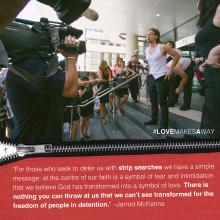
A group of Christians protesting detention for asylum-seeking children stripped off their clothes on the steps of the magistrate's court in Perth, Australia on Wednesday.
The group, Love Makes a Way, had just pleaded guilty to trespassing in Foreign Minister Julie Bishop's electorate office in December, where they had staged an eight-hour peaceful sit-in and several members were reportedly strip-searched.
From the court steps, National Director of Common Grace and Sojourners contributor Jarrod McKenna quoted from the book of Matthew before he and others in the group began stripping off their garments — this time, willingly.